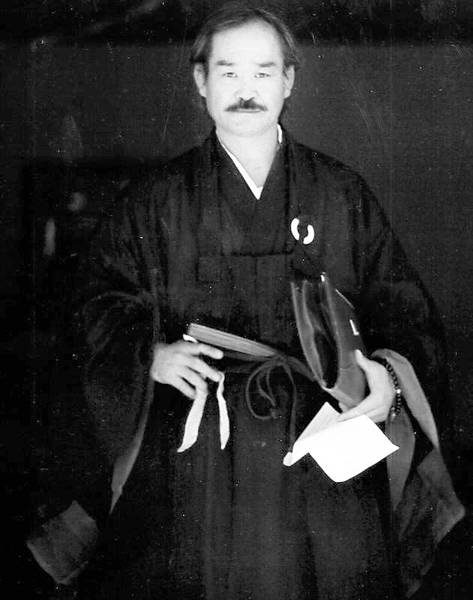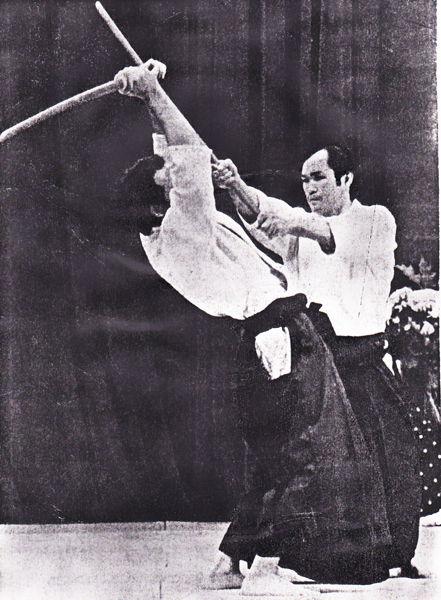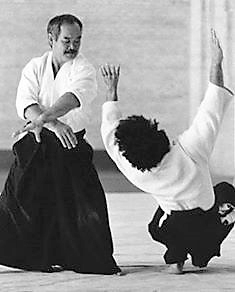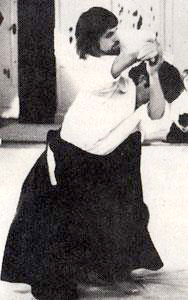
The grand finale of each week at the Hombu Tokyo was Chiba Sensei’s Friday afternoon class. The term “battleground” comes to mind, a battleground of emotion. The emotional intensity, and range of emotions in that class was amazing — terror, fearlessness, vulnerability, and invincibility. Chiba sensei was known for his ferocity, and the extraordinary intensity of those classes; an atmosphere of life and death. In contrast to attendance at most classes at the Hombu, attendance at his was sparse. I felt this group of students to be very special, a small elite group in the sea of martial artists in Tokyo. To most students at Hombu Dojo we were just crazy.
Chiba sensei would approach the training hall slowly and deliberately. He paused at the teacher’s entrance to carefully peruse the battlefield before entering. He sometimes arrived with a bloody rag wrapped around his hand. Not a bandage, just a blood-stained rag. We assumed it was from his live blade sword work. That bloody rag set the tone for his class. I think that was intentional. It symbolized the atmosphere of danger, and the acute awareness required. Seeing it was like a Molotov cocktail thrown on dry timbers, it ignited something very hot in us. It attracted only those with some deep need to burn hot. Were we moths drawn to a flame?
Sitting seiza in the nervous silence before class, in a huge training hall filled with only a few students. I watched to see if anyone else would show up. No one else ever did. There were about a dozen of us, in a school with an average class of fifty or sixty. But when I looked at who was there I was never disappointed. Chiba sensei's private students, a few other foreigners and Japanese black belts, Shibata Sensei and Moriteru Ueshiba. Shibata had been the senior uchi deshi of the school, and Moriteru, or “Waka Sensei,” was the grandson of O’Sensei, the next headmaster of the art. I felt honoured to be there.
Real and immediate danger was felt by everyone in that room. We trained together in a state of hyper-alertness. It was frightening and exciting at the same time. The slightest sound is magnified. The slightest movement nearby is detected.
Danger is very uncomfortable, but it heightens our senses. If we channel fear into acute awareness the present moment expands. “Now” becomes immense. Fully alive. I have learned that powerful energy usually feels uncomfortable. A small price to pay.
This feeling of danger created a strange kind of purity, an equality — regardless of size, rank, or level of skill. Everyone felt fear, no one tried to hide it. That shared experience created an amazing level of cohesion. A communion of fear. A level of intimacy difficult to describe.
The group adrenaline burned away pain, weakness, timidity, and all self-consciousness. All that remained was bold action. The battlefield is too hot for ego. There were bumps, bruises, scrapes, and sprains — but no complaining, explaining, or apologizing. None of that was necessary. Incredibly, there were no serious injuries. The intensity of awareness prevented that.
Impressive looking technique held no value here. Success and failure had no meaning. Decisive action was all that mattered. Results were irrelevant. It was pure Zen.
Overpowering group energy. Self was swallowed up and lost. At that place — during that hour there was no other way to be. It was wonderful, and exhausting. Once a week with Chiba sensei at the Hombu was all I could handle. All my other aikido classes were like a vacation.
I am deeply grateful for being part of something so special. It was not only Chiba Sensei, it was the particular mix of individuals who came together each Friday afternoon. An extraordinary group chemistry was generated. Any intermediate or advanced student was free to attend; you just had to show up. Amazingly, in a student body of perhaps five hundred, only twelve ever came.

Hard and Brutal Times Ahead
The course was as tough, or perhaps I should say, as brutal as any I have ever experienced in my fifty-five years of aikido, and when I say "brutal," I don't just mean on the part of Chiba sensei. We were equally to blame. Each technique was a confrontation between Chiba sensei, and each and every dan grade. We were left in no doubt that Chiba sensei was up to the test. Not only "up to it;" I had the distinct feeling that he intended to leave us in no doubt who he was and why he was here. He always looked very menacing, serious and threatening, and in a way I think he actually enjoyed the challenge. It was only our years of hard training with Abbe sensei that enabled us to avoid many injuries. Chiba sensei was utterly unlike Noro or Nakazono; he simply met you head-on. In that aspect, Chiba sensei exemplified the same attitude both Abbe Kenshiro and Abe Tadashi, that you would only be thrown if the technique took you. In those early days of Aikido in the UK, flying ukes were an unknown species.

Training under Chiba Sensei
It was very hard both physically and mentally. There were other factors such as little sleep and sometimes too much to drink. I recall many courses where I slept on floors, in the dojo etc. In one particular incident, while driving to London overnight with Coyle sensei to attend a course in Chiswick, I fell asleep at the wheel and hit the car on the central reservation barrier. It sure shook me up. Another time both myself and Coyle sensei were so tired from travelling from Glasgow and the day's keiko, that Chiba Sensei took us back to his rented flat in London and Chiba san fixed us up with some hot food and a beer but most of all a hot bath to ease the pain. After 50 years I can still sense the relaxed feeling of the warm water on all the aches and pain.

I am eternally grateful to Chiba Sensei for introducing me to the beauty and sadness in both the practice and teaching of Aikido and setting me on this path.
With so many dojo members facing such major losses in the past years, I’m reluctant to say much more, but I’ll continue to do my best to keep some of Chiba Sensei’s spirit alive in our dojo and in our daily Aikido training.
